full posts
- Checked to see if there are any play tests this year (more on that, later)
- Picked up an (additional) copy of Miseries & Misfortunes, to supplement the Kickstarter
- Got the small zine game Catch the Devil
- Most excitedly, I commissioned a toned paper sketch from David Peterson AKA Mouse Guard
- I’m a fan of the Vampire the Masquerade product line (before problems with 5th edition and their catering to abusers and the alt right, anyway). I’d been wanting Beckett’s Jyhad Diary for a while, but held off due to cost. IPR had a nice sale, so I got a copy.
- Also on the Vampire front, they had physical copies of the Prince’s Gambit. This is another type of game I’m always up for: parlor/social-deduction game.
- I also grabbed Companions’ Tale, because it’s a mapmaking and collaborative storytelling game. I like the idea of examining what version of the stories live, too.
- IPR also had physical decks for the small LARP Winterhorn, which is a game where you play the regime trying to stop peace & justice activists. Understandably, this is an educational LARP which can help to threat-model our own activism efforts, examining how we might be more resilient and effective.
- Torchbearer 2 has a ton of revisions, they’re very excited about it, and they’re looking at how they can get some great playtesting and feedback before publishing
- Miseries & Misfortunes is going to start having some setting, scenario, & lifepath expansions because the 5 years in Paris (1648-1652) is concurrent with interesting things happening in many other places in the world (and is apparently called “the general crisis” by some historians)
- The “secret playtest” we did at #GenCon2018 has had more playtests, and much of the design work is complete, but i’ts been a bit on the back burner as other projects have taken front stage (and the challenging parts of component, art, etc. production have come up)
- God is bigger than our documents
- God is bigger than our issues
- God is even bigger than the Bible
- We do not walk alone
- God walks with us
- We walk with others
- The unity of the Spirit is the basis not the result of walking together well
- Humility
- Patience
- Suffering each other (forbearance)
- Forgiveness (gracing each other as God has graced us)
- Seeing the face of God in each other
- hospitality
- vision of hope
- openness
- prayer for each other
- Creation care, climate change, watershed discipleship, climate justice
- LQBTQ inclusion
- Conflict skills, difficult conversation skills, hospitality, and listening
- Grounding our peace witness in Jesus and the biblical texts
- Immigration and border crises
- Deutoronomy 30:2-4
- Isaiah 40:11
- Jeremiah 29:10-14
- Zechariah 10:8
- Ephesians 1:10
- Ephesians 2:11-22
- We need more resources: volunteers, money, and tangible goods
- We need less structure, less mechanical authority, and more relational authority
- We need to assess where God is calling us today
- We need to embrace the generations
- We need better leaders
- We need to be willing to say “no”:
- to doing too much
- to worldly labels and practices that divide us
- to things that don’t model who we are as Anabaptist peacemakers
- to traditions and practices that discriminate or hide evil
- expanding our peacemaking activities beyond the struggle against militarism and overt violence
- an increasing acknowledgement and focus on the sources and systemic issues that contribute to violence
- an acknowledgment of the intersections and interconnectedness between many of those issues
- an increasing understanding of ways we have been complicit in those systems
- struggles with strategizing or building effective coalitions when there are so many fronts in the struggle
- placing great value in relationship-building and local peacemaking partnerships
- Luke 13:34-35
- To better understand what technologies and practices are worthwhile and valuable for me.
- To focus more on high-value activities
- To spend more time reflecting, thinking, and praying.
- To spend more time reading, creating, repairing.
- To spend more time in nature.
- To reset my habits and routines.
- To help fight the attention economy and the harmful effects it has for discourse, complex thought, and mental health.
- Is this absolutely necessary?
- Could this wait?
- Does this align with my highest values? (Mutuality, Learning, Resilience)
- Can I mitigate the harmful effects?
- Is there another way to accomplish this, even if it would be inconvenient?
- I can listen to audiobooks, but only with my family
- On the weekend, I can watch a movie or couple episodes, but only with family or friends
- I have direct links to Facebook Group/Event pages that I need to check periodically, and will check those once a week
- Clutter is costly
- Optimization is important
- Intentionality is satisfying
- Serve something you deeply value
- Be the best way to use technology to serve this value
- Have a role in your life that is constrained with a standard operating procedure that specifies how you use it
- Prioritize demanding activity over passive consumption
- Use skills to produce valuable things in the physical world
- Seek activities that require real-world, structured social interactions
- Anabaptism - Anabatism, Mennonites, and faith from those perspectives (RSS Feed)
- Digital Minimalism - intentionality around use of tech (RSS Feed)
- Games - a broad category for card games, board games, role-playing games, party games, live action games, and video games (RSS Feed)
- Humor - satire, comics, etc. (RSS feed)
- Ideas - food for thought, strategy, politics, philosophy, theology, psychology, etc. (RSS feed)
- Resilience - information/cybersecurity, sustainability, emotional & psychological resilience, posts from my Newsletter/Podcast (RSS feed)
- Review - year-in-review, looks back, but also comments on books, tools, video, music, events, etc. (RSS feed)
- Soccer - maybe I should just make this “sports”, but I really only share about Soccer (core teams: Indy Eleven, US Women’s & Mens’s national teams, Chelsea FC) (RSS feed)
- No Time to Spare: Thinking About What Matters - Ursula K. Le Guin - This year cemented Le Guin as my favorite author, and this collection of blog posts demonstrates how much her talent can shine through even in such a simple form
- The Cross and the Lynching Tree - James H. Cone - Cone explores the parallels between them, why they were obvious to oppressed people, and why white theologians ignored those topics
- Upside-Down Kingdom, The: Updated Edition - Donald B Kraybill - if you’re frustrated that many modern Christians don’t seem very Christlike, you may find this Anabaptist perspective refreshing
- The Undoing Project: A Friendship That Changed Our Minds - Michael Lewis - a biography and history of some of the pioneers of Behavioral Economics
- You Need a Budget: The Proven System for Breaking the Paycheck-to-Paycheck Cycle, Getting Out of Debt, and Living the Life You Want - Jesse Mecham - budgeting that’s not about shaming, but about making sure you are mindful about putting your money where your values are
- Religion and Empire: People, Power, and the Life of the Spirit (Facets) - Richard A. Horsley - not a fully coherent work, but nevertheless a collection of insightful essays, particularly the one examining how secular religious holidays are molded to support empire
- The Fifth Season (The Broken Earth) - N. K. Jemisin - great speculative fiction
- The Obelisk Gate (The Broken Earth) - N. K. Jemisin - book 2 and still really liking it
- The Lathe of Heaven - Ursula K. Le Guin - what if you had the power to change the world with a dream?
- Changing Planes - Ursula K. Le Guin - delightful stories of fantasy cultures from someone who’s learned to visit other realms of existence
- To Kill a Mockingbird, 50th Anniversary Edition - Harper Lee - you probably know this one, already
- Embassytown - China Miéville - philosophical speculative fiction
- Scythe (Arc of a Scythe) - Neal Shusterman - YA dystopian, with lots of fodder for great philosophical discussions
- The Last Unicorn The Lost Journey - Peter S. Beagle - I’m not familiar with the common version of this work, but this new edition of the original draft was very good
- The Gruffalo - Julia Donaldson - in this children’s picture book, the trickster is a mouse that avoids being eaten by all the predators
- The Last One - Alexandra Oliva - a suspenseful book that makes skillful use of dramatic irony
- A Coffin for Dimitrios - Eric Ambler - a classic crime novel with many points for consideration
- Little House in the Big Woods - Laura Ingalls Wilder - the start of the classic series
- Brief Cases (Dresden Files) - Jim Butcher - This collection from the Dresdenverse has some fun vignettes, especially from the bigfoot “River Shoulders”
- Glass Houses: A Novel (Chief Inspector Gamache Novel) - Louise Penny - This was a fun mystery, made better by the audiobook narrator we heard (didn’t require prior knowledge of the series)
- Uproooted - Naomi Novik - I had trouble rating this one, as it vacillated anywhere from 3 to 5 stars
- One mentee turned around a toxic relationship with their manager, had a great quarter, and is excited for next year
- Two mentees found better roles more suited to their skills and experience
- Another mentee received a well-deserved promotion
- Akimbo: I have no interest in marketing, but I do have interest in the way Seth Godin explores big ideas.
- Code Switch: If you don’t know what code switching is, you definitely need to listen to this. If you do, you will likely enjoy the variety of topics and perspectives and the charming hosts.
- Freakonomics Radio: granted, some of this is “pop econ”, but it’s entertaining and frequently has good investigative research or covers big ideas.
- It’s Going Down: the guests frequently outshine the host, but this anarchist podcast is a good source of news from the perspective of the marginalized & oppressed and is sure to expand your perspective.
- The Knowledge Project with Shane Parrish: an extension of the Farnam Street learning website, this podcast is interviews with “big thinkers”. The interviews often wander, but there are almost always important takeaways or food for thought.
- Note to Self: a philosophical take on technology trends.
- Radiolab: entertaining and sometimes enlightening.
- The Rebel Beat: this podcast covers music and radical politics together, showcasing new and old music and interviewing artists of varying genres.
- Risky Business: information security current events coverage, with excellent analysis. Easy to skip the sponsor interviews, but even those are well done.
- Scene on Radio: I started this podcast with their excellent series “Seeing White”, and they continue to deliver with “Men”. As you add this one, make sure you have your app setup to listen to a season in order.
- Wait Wait…Don’t Tell Me!: a humorous weekly news quiz that you probably already know about.
#GenCon19 Day 2
I started today off with some Games on Demand, and Miles, Christian, and I got to try the Penthouse playset with a couple others. It was epic in both the funny and horrible ways that Fiasco should be. Fiasco at GenCon seems to now be an annual thing for Miles and me.
Then, it was time for our Aecer’s Light Burning Wheel game with Mad Jay. We had a great time, and I’m very interested in what he is doing with the Wolfen and Roden in Burning Wheel. The zine and scenario are going to be great!
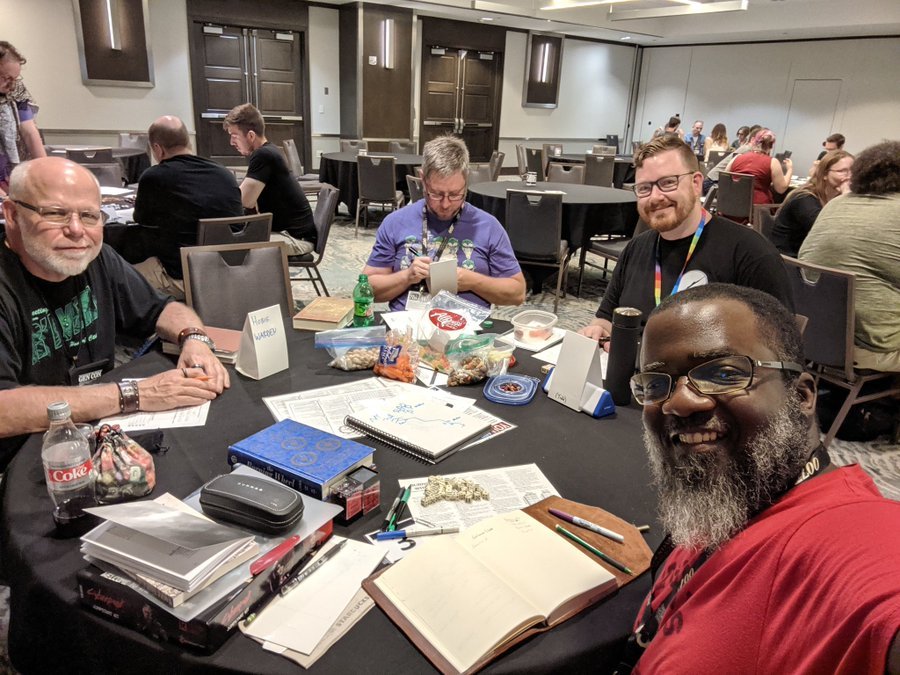
I got a chance to swing by the Burning Wheel Headquarters booth and see David Peterson (AKA Mouse Guard) in action, working on the piece I commissioned. That was quite the treat, and I’m really excited about how it is going to turn out!
I also found a good-condition used physical copy of the D6 System book, which you may recognize as the core rules that powered West End Games Star Wars (and other games).
The day ended with a fun dinner with friends. Looking forward to another great day at #GenCon19
#GenCon2019 Day 1
I started GenCon off right by going to the gym before opening ceremonies! I am happy of myself!
When the expo hall opened, I made a straight line to the BWHQ booth, as has become my tradition:
Indie Press Revolution is always a good booth to check out physical RPG products. Bonus: they email you a copy of the digital book when you buy physical. I found some great stuff:
I also swung by Posthuman Studios, and picked up my Kickstarter version of Eclipse Phase 2nd Ed. As usual, these folks were really cool to chat with at the booth.
Our coupon book had a free copy of Dwar7s Duel so I had to grab that, because Dwarves. It looks to be a simpler version of Dwar7s Fall, maybe?
And finally, I couldn’t let a GenCon go buy without my customary Timid Monster. These are very cool and I have a little stand for them in my office.
After the expo hall, I enjoyed a hilarious game of Goblin Quest with Miles at Games on Demand, my favorite place to try cool RPGs.
Up next was the update panel from Burning Wheel Headquarters. We heard about what’s going on with the Burning Wheel universe. In summary:
Tonight, I’ll be joining a big game of Torchbearer that got coordinated via the Burning Wheel forums.
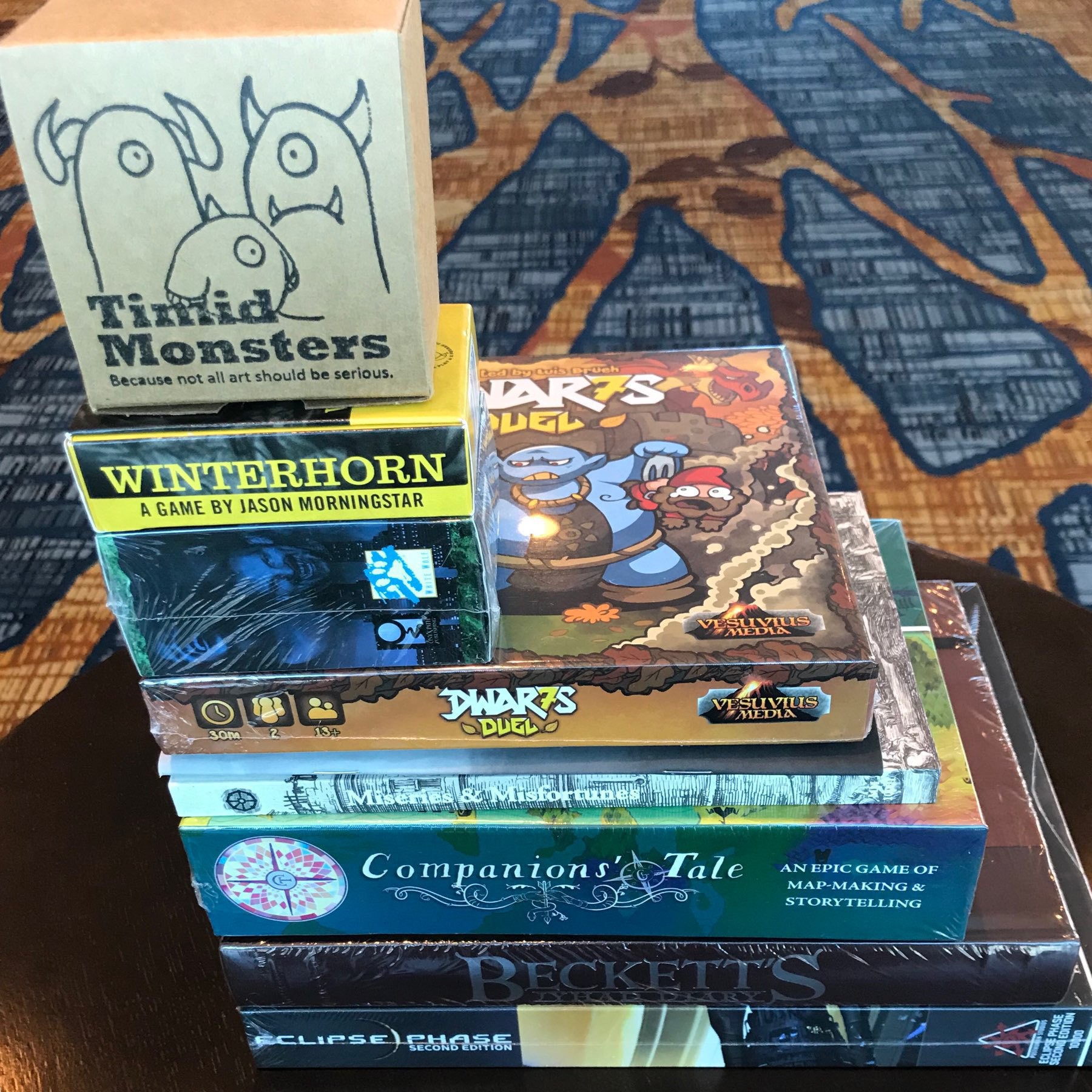
#MennoCon19 Delegate Report Day 5 #BringThePeace
Day 5, Day 4, Day 3, Day 2, Day 1
We started our final delegate session by discussing the Churchwide Statement on the Abuse of Child Migrants, including the changes that had been made to the draft. There was a short time for Q&A, in which several folks urged for stronger language in parts, or more details on next steps. MCC and others will continue to help with materials for going forward.
The vote for the resolution passed with only 2 dissenting (of 495). One of those two dissented because they wanted a stronger resolution.
We received reports from the Step Up program, and three amazing representatives from the program.
We also got an update on the Voices Together hymnal project, which is expected to be ready in fall 2020.
Our final discussion around our Renewed Commitments was for the third item: Experience Transformation.
“How have you experienced the transformation of the Holy Spirit in your life? How might that inform the transformation of our shared life as a church?”
At my table, we had a joyous moment of thanks and blessing from a retired (and now volunteer) pastor. I asked him a little bit about how he came to see such beauty and hope in change, even as some struggle with it.
He shared the following wisdom:
“My first rule is: you’re not in charge anymore.”
“Second rule: give only blessings. Let others do the critique.”
“It’s about letting go, letting God. Trust the Sprit of God.”
He commented on why some folks struggle with change:
“It has do with fear, and thus wanting to be in control. People who can’t let go are unhappy.”
We also had all-group Q&A, again, with many great comments. One person reminded us that sometimes the Spirit moves in spite of us.
Our final worship session had Executive Director Glen Guyton as speaker…
…and he kicked it off by singing his rendition of Nirvana’s Come as You Are with the worship band.
(Believe me, I’ll add video here, if they release it. Update: here’s the video!)
Glen reminded us over and over that “God is Bigger”.
He repeatedly gave us the call to #BRINGTHEPEACE, and even reminded us of his own background:
“I was an officer in the military & now I’m part of a historic peace church, so don’t tell me your message doesn’t work”
Glen’s charge for us is to “put some action to our words”
“What are you going to do to #bringthepeace after you leave?”
#MennoCon19 Delegate Report Day 4
Day 5, Day 4, Day 3, Day 2, Day 1
We again had two delegate sessions today, with us now moving into more of the “business” for the week.
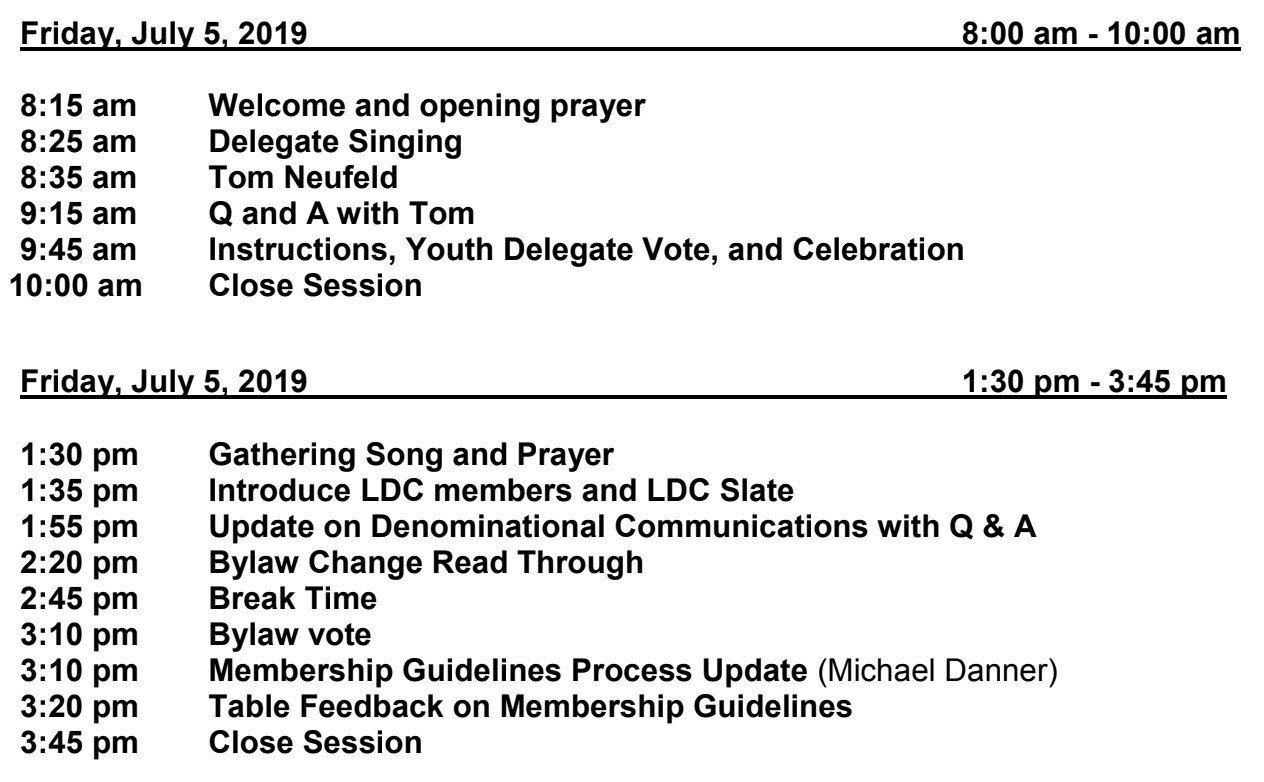
First, the resolution committee brought forward a new resolution that was generated this week: Churchwide Statement on the Abuse of Child Migrants. The drafters of the resolution received help from Iglesia Menonita Hispana, delegates, and the resolutions committee. It has the support of the Executive board and sufficient delegate signatures to be brought to the delegates.
As the resolution was read to the delegates, it ended with a standing ovation. You can read the text here.
We had another equipping study with Tom Yoder Neufeld. This time, we continued into chapters 4-6 of Ephesians, and how we live in God’s blessing.
Tom tells us:
And we exhibit the following characteristics:
Using the wording and imagery of the text, Tom imagines us as “chain gang of peace”, trying to run together, like in the poster for O Brother Where Art Thou?
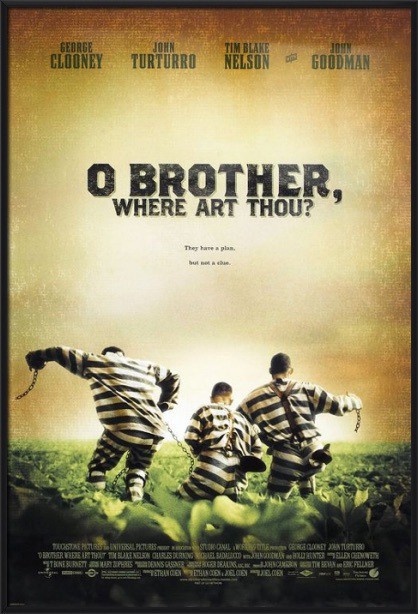
We should be patient “seventy times seven”, but if bonds break, it should be with “grief” not “good riddance.”
Tom reminds us that “the unity of the Spirit is bigger, wider, and deeper than any of our organizational structures.”
In Q&A, we were reminded that the pain is often on the party in the margins or minority. But we need to put the greater burden on the side with power, not the other way around.
Next, we discussed the proposal to formally add youth delegates (aged 16-21). This would include 1 per congregation, 2 per conference, and 2 per racial-ethnic constituency group.
It was clarified that current delegates can come from this age group, but that this codifies adding some specifically of that age range.
The measure passed nearly-unanimously with only 6 of 495 delegates dissenting.
I interviewed one of those dissenting, later. They were not against youth being delegates, only the way it was being implemented (as additional count and bylaw changes). They were afraid it cemented that youth are separate and different, rather than integrating them more. They would have preferred we simply passed a resolution granting Step Up members voting status.
In the afternoon session, we discussed the leadership discernment slate. The Gifts Discernment team worked to fill roles at least 50% women, and at least 20% people of color. The slate had 48% women and 40% people of color.
After reviewing the slate, they were approved unanimously.
Glen Guyton presented the plan for a new communications strategy. It would focus on a unified identity-building communications approach for MCUSA. It would also include The Mennonite going independent from MCUSA and joining Mennonite World Review.
I personally expressed concerns about how The Mennonite needing to become financially self-sustainable could lead to commercialization and the related negative effects that commercialization has on news. From Glen’s response, it sounds like those factors are being considered.
In addition to the youth delegate changes to the bylaws, we also reviewed the other adjustments to the bylaws, which you can read here.
These changes (including removing a reference to telegram!) were passed unanimously.
Next, Michael Danner led a discussion on the membership guidelines, so that the executive board could get a sense of how our constituencies are feeling about handling membership guidelines.
We were asked to score both how important amending the guidelines is to our constituencies, and then how much energy we have to put into it over the next two years.
They also asked for our comments. Several comments from my table and others mentioned that the Brethren Mennonite Council for LGBT Interests and Pink Menno have people willing to advise on the process and wording for the guidelines. This would help limit some of the effort and pain that might otherwise have to be played out in local churches. As we discussed above, we want less of the burden to fall on those with less power.
Both worship services today focused on the movement of the Spirit, a topic that may have felt uncomfortable for some Mennonites. But the Energy, the Breath, the Wind blew through our worship space, surprising us with new things.
#MennoCon19 Delegate Report Day 3
Day 5, Day 4, Day 3, Day 2, Day 1
Thursday’s Delegate Agenda:

Tom Yoder Neufeld continued to teach with us, today. He started by expressing thanks for the corrective and affirming feedback he received from yesterday’s session, reminding us that receiving such is a good sign of mutual discernment.
His theme was “Unity of the Spirit - body and temple” based on Ephesians 4:3
making every effort to keep the unity of the Spirit in the chain of peace
Tom used the literal translation of “chain” for what might normally listed as “bond” because it’s an appropriate reminder that chains are for things that come apart. Peace must be maintained.
“Spirit” Tom said, is “one of the slipperiest terms in the English language.” With Spirit (whether “ruach” or “pneuma”), we have multiple genders or no gender. We have meanings of energy, breath, wind, and more. Tom encouraged us to read passages with “spirit” using the other words. He suggests it could be appropriate to call ourselves “people of the Wind.”
Tom reminded us that “the Spirit unsettles us because we’re not controlling it. The breath gives life to things we didn’t know should live.” It brings life, but “it also blows us around, and we look for places to hang on….The unity of the Spirit is a turbulent storm within God’s embrace….That’s what peace looks like until we all see God face to face.”
Tom also reminded us that “peace is constantly being unsettled by it’s generosity to strangers and enemies.”
The temple of God is not a single body, but the body of Christ, the Christian body. We are a poem, handiwork, or artwork of God. And unlike other art, “what makes the body of Christ most beautiful and perfect is its generosity to the least fitting parts of the body that are being grafted in.” God crafts “with those pieces that have been thrown away.” (Quilts, it seems, might be an appropriate metaphor!)
Tom says we can test whether we are being a peace church together by our:
Tom reminds us that we must hold together both radical hospitality and radical transformation. Yes, the church is like a hospital, but if people don’t get better in a hospital, it should be shut down.
When it came to Q&A, Tom reminded us that Ephesians, Galatians, Matthew, and James are all in the New Testament, and they “all represent communities that were looking at one another with suspicion.” We need to live with that tension and use our creativity to mending “what’s been broken.”
Extending the metaphors further, one person expressed concern about when the temple being built has parts that are unsafe. Tom encouraged us to look for Jesus in the unsafe places, to address problems, and mentioned Matthew 18 as one of the biblical warnings.
When asked about traditions of exclusion, Tom returned to the translation of Wind, and reminded us that “Wind can create a lot of damage. Some things [traditions] can use some damage in the church.”
For our afternoon delegate session, we focused on the second item in our Renewed Commitments: Witness to God’s Peace.
We were asked to discuss the following:
Identify one part of our shared peace witness we should work together for the next biennium?
As with my report from day 1 and the peacemaking gathering, our delegate body made it clear that peacemaking goes well beyond resisting war. As our tables responded to the question, there were many incredible responses, but I’ll highlight the following ones that were recurring themes:
May the energy, breath, and wind of God carry us into creative acts of witnessing to God’s peace.
#MennoCon19 Delegate Report Day 2
Day 5, Day 4, Day 3, Day 2, Day 1
We had two delegate sessions, today, as well as two worship sessions and an afternoon time for a seminar/panel.
Here was our agenda for the delegate sessions: 
Note that there are no resolutions scheduled for today. In fact, there are none for the whole week. The focus this year is continued work on Journey Forward and our Renewed Commitments. That said, there is a Resolutions Committee table, because if resolutions are to be introduced, they want to make sure they are clearly stated and ready for discussion & vote.
The moderator expressed desire for us to work in “spiritual and mutual discernment” as much as possible, and to avoid parliamentary procedures except as needed for official business.
One of those pieces of business that we will be voting on are bylaw updates. The bylaw changes include adding youth delegates as full voting delegates. This is an extension of the great Step Up program that started last convention at #MennoCon17 and the Future Church Summit, and has continued for #MennoCon19.
Tom Yoder Neufeld led the delegates through study of how God gathers us, using the following verses:
God “whistles” for us to gather into oneness with each other and with God. In looking at Ephesians 1:3-14, Tom reminds us that
“You’re meant to run out of breath rehearsing the blessings of God.”
Tom’s overall message focused on Ephesians 2:11-22, and started a process of investigating how we are both unified and diverse.
“What makes the body of Christ perfect is all the strangers and enemies that have been grafted in.”
At the request of the delegates, we had time to discuss in table groups before moving into Q&A with Tom. In answering questions about “good” versus “bad” diversity, he challenged diversity that is a result of “brokenness, hostility, fear, and sin” while also warning against trying to set a “horizon” or limit on how far God is going with “gathering all things.”
To another question about spiritual diversity, Tom again warned us against trivializing the radical provocation of confessing Jesus Christ as Lord by treating that Christian profession of faith simply as “one flower in a floral arrangement of religions” but at the same time recognizing that God is present in ways and places we aren’t yet imagining.
In our afternoon session, Executive Director Glen Guyton gave a state of the church report. He detailed some of our needs, including:
We also started a series of table discussions regarding the on Journey Forward process and our Renewed Commitments. Todays question focused on the Follow Jesus commitment.
Table groups discussed where Jesus would show up in our town today, where Jesus would go, what Jesus would say, and what Jesus would do. We then shared some of the insights with the group.
We saw Jesus being born in or visiting the margins. We saw Jesus in the tent camps, immigrant detention centers, women’s shelters, and more. We wondered about where Jesus would proclaim hope, and what the “woes” and “blessed” statements might be.
We looked for where Jesus would have righteous fury with us or with systems. Perhaps Jesus would challenge us with why we haven’t been making disciples. Or how our rules, traditions, and barriers keep people from feeling welcome in our churches. Maybe Jesus would storm into hospitals and throw medical billing into the incinerators.
Maybe Jesus would ask us why we haven’t been loving each other?
May we continue to look for Jesus in our midst and in our margins.
#MennoCon19 Delegate Report Day 1
Day 5, Day 4, Day 3, Day 2, Day 1
I arrived early (very early) to Kansas City, with plenty of time to get registered and reacquainted with the KC Convention Center before the begin of our Journey Forward: Peacemaking workshop.
The workshop started with singing Longing for Light and My Soul Cries Out/Canticle of Turning. A beautiful way to begin a peacemaking gathering!
We engaged in “speed networking” to meet a few other participants and share what organization(s) we were representing, what peacemaking activities we are involved in, and what we were excited about for the gathering.
Our facilitator (the same who helped facilitate our denominational discernment at #MennoCon17) worked with us through several methods for examining and discussing what we are experiencing with peacemaking. These included introspection, paired discussions, small group discussions, and various all-room activities.
Some of the peacemaking topics our communities and organizations have been engaging in: 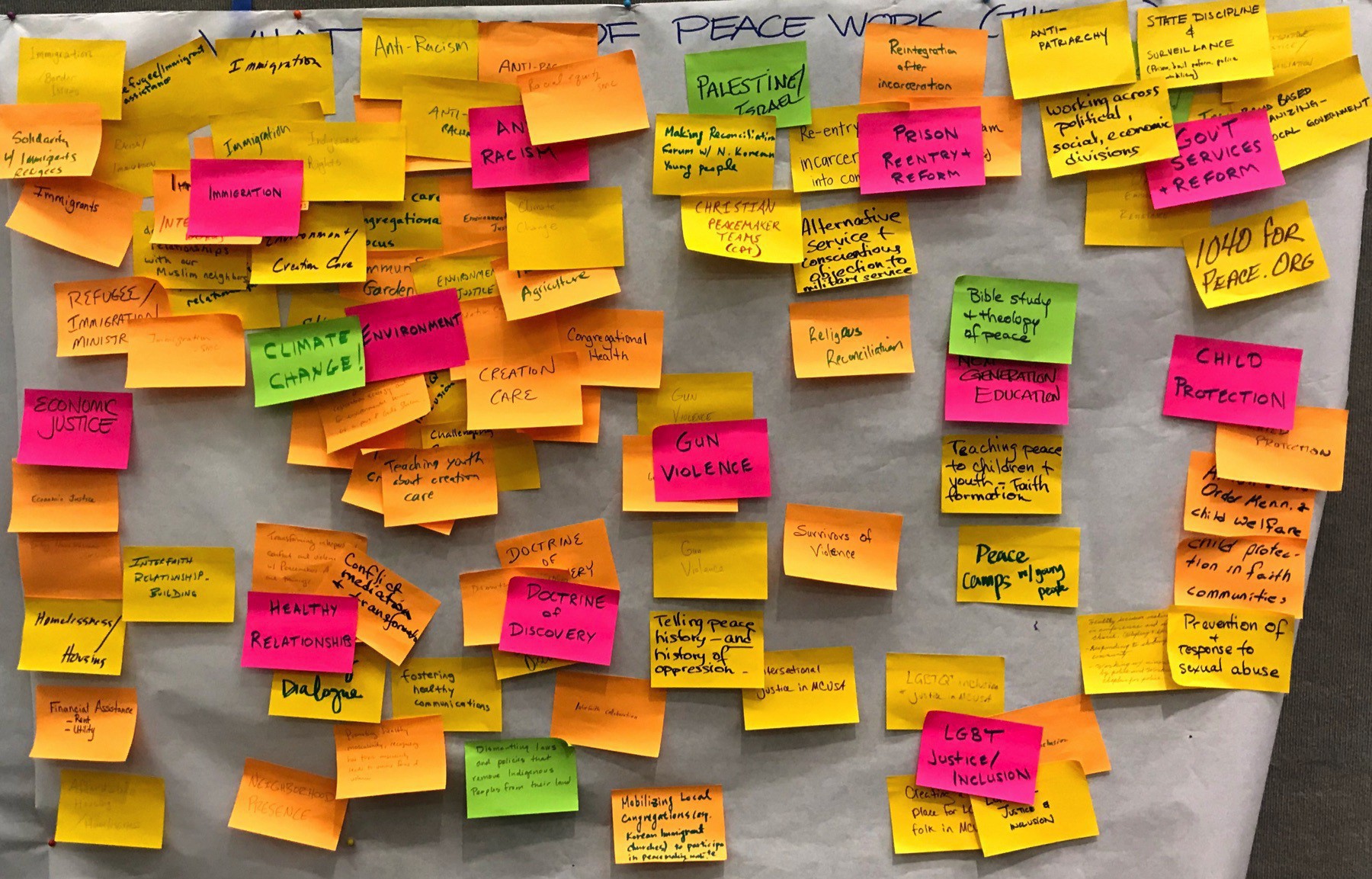 Some of our local peacemaking partnerships:
Some of our local peacemaking partnerships: 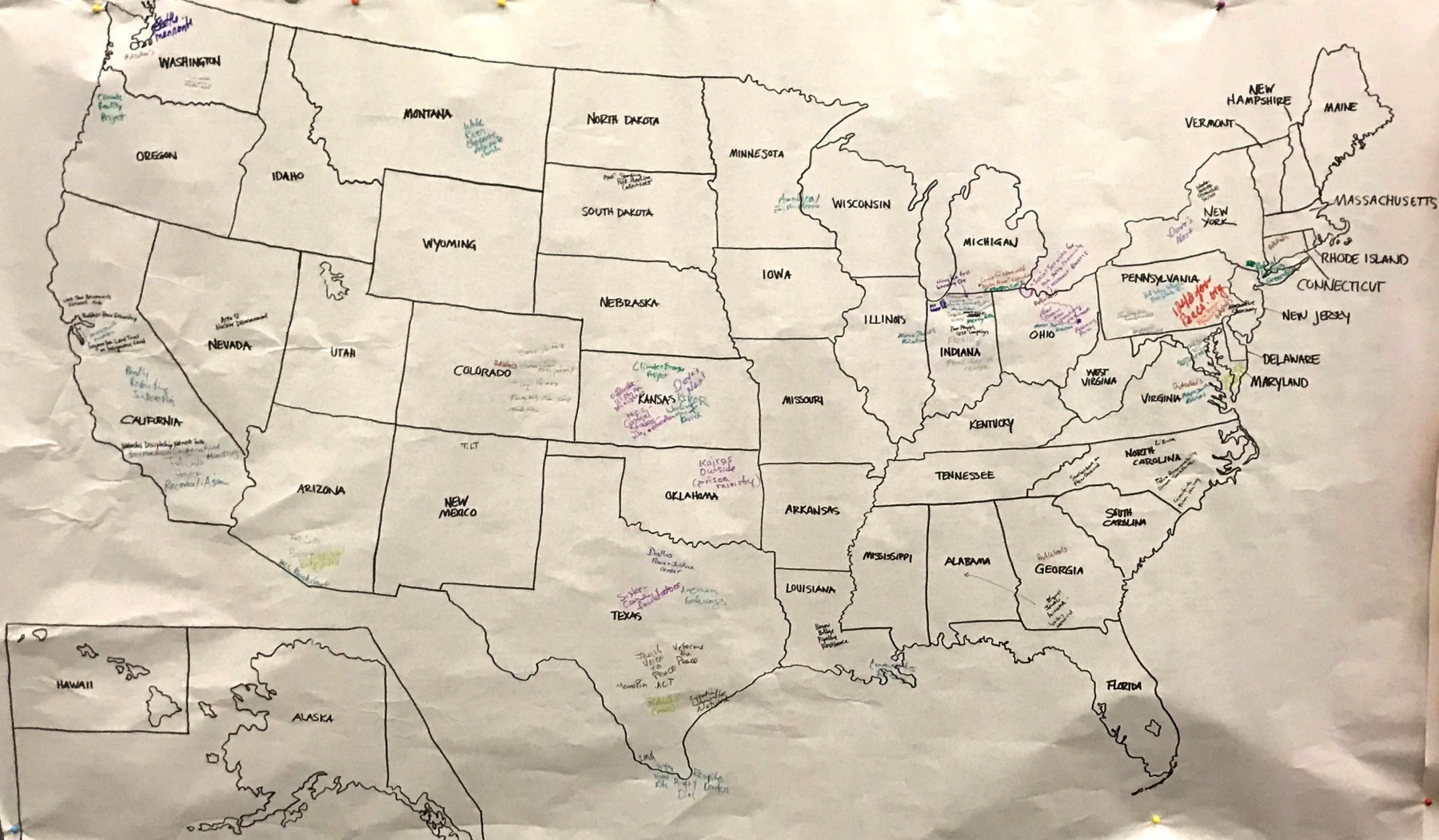 Some of our worldwide peacemaking partnerships:
Some of our worldwide peacemaking partnerships: 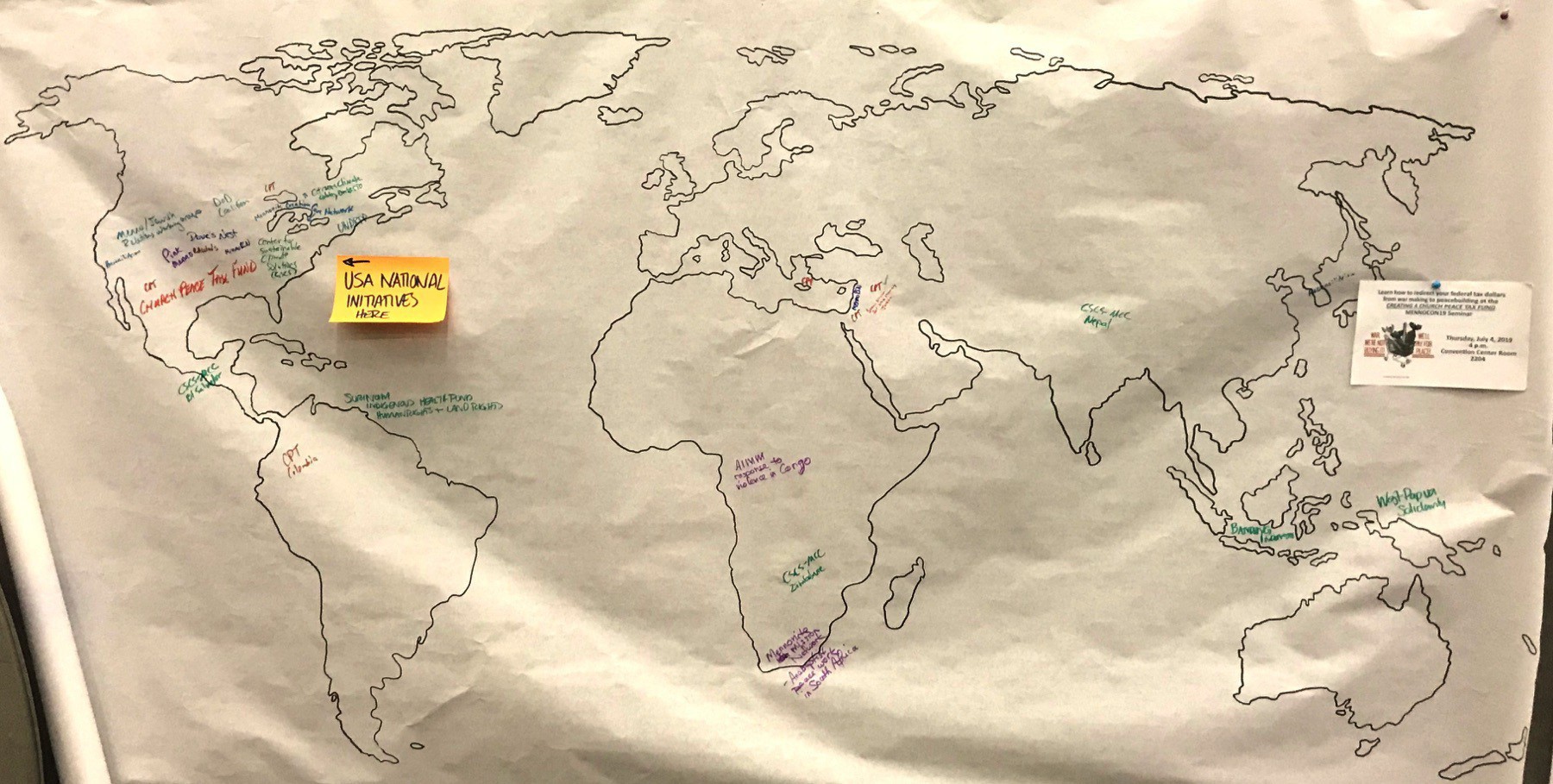
Several themes emerged multiple times or in multiple groups throughout the day, including:
During Open Space Technology time, I hosted a group to discuss the idea of aligning our church body by watersheds, instead of governmental boundaries (and our current Districts and Conferences).
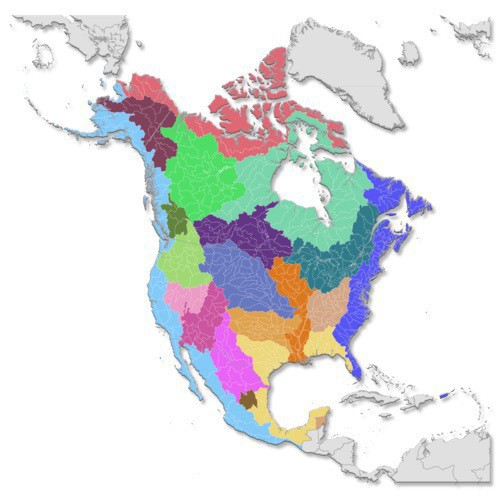 Watershed discipleship breaks down barriers between urban and rural people. It also highlights the many ties among ecology, economy, politics, and other factors affecting those people whose well-being and fates are tied together. While we know there are potential challenges (such as practical implementation issues and avoiding exclusionary “local nationalism”), looking at peacemaking through this lens yielded fruitful conversation and many ideas. We also discussed that church communities can start partnering in their watersheds, regardless of denominational structural changes.
Watershed discipleship breaks down barriers between urban and rural people. It also highlights the many ties among ecology, economy, politics, and other factors affecting those people whose well-being and fates are tied together. While we know there are potential challenges (such as practical implementation issues and avoiding exclusionary “local nationalism”), looking at peacemaking through this lens yielded fruitful conversation and many ideas. We also discussed that church communities can start partnering in their watersheds, regardless of denominational structural changes.
The peacemaking gathering shared many options for initiatives we could take after the gathering, and there was resounding agreement to have further engagement and sharing on these topics.
We closed the gathering with communion and blessing.
Later, the whole convention had our first worship. This year, adult and youth worship are combined. There’s nothing like 3000+ Mennonites singing together. “How can I keep from singing?” 🎶 (Worship sessions will be streamed live all week, if you want to follow along.)
I appreciated the “land acknowledgment”, with respect shown to the place we are inhabiting and the First Nations that stewarded it. I also appreciated that the worship team brought a variety of instruments and music, and that prayers were heard in many languages, including American Sign.
Executive Director Glen Guyton reminded us that we are a diverse group, but that he hopes “we are unified in our desire to bring healing and hope to the world.” May it be so.
You kill the prophets, and stone the people sent to you
Jerusalem, Jerusalem! You kill the prophets, and stone the people sent to you! How many times did I want to collect your children, like a hen gathers her brood under her wings, and you would have none of it! Look, your house has been abandoned. Let me tell you this: you will never see me until you are prepared to say, “A blessing upon you! Welcome in the name of the Lord!”
Digital Declutter: the Plan
If you read my review of Digital Minimalism, you’re aware of the Digital Declutter process. If not, head over to read it and then come back here.
(Note: I did a podcast on my experiment from this book, over at Resilient)
Why
What
I am avoiding any unnecessary technologies, and using these questions to help me consider whether a technology is truly critical:
I am blocking off time twice a day to check email (once in the morning and once in the afternoon), and letting it buffer in between.
I have eliminated most applications from my phone and blocked social & news sites in my browsers. The only alerts I get from my phone will be for direct people connections (texting, work chat, phone calls, video calls, etc.) or travel (rides, flights, directions, etc.), and my phone will be in “Do Not Disturb” except for core work hours (7-6). My DND is set to allow calls from numbers that are in my contacts.
I will do all my (professional and personal) work from the computer and not my phone.
I will not play video games, read ebooks, or play music & podcasts.
I will do my shopping in stores and I will use the library.
I am establishing operating procedures for my chosen special cases:
When
I’m beginning tonight, with the start of our Ash Wednesday service and the beginning of Lent.
I’m ending on Easter Sunday (April 21st on this calendar) and the end of Lent.
I am holding “conversation office hours” every day between 4:30 and 5:30 Eastern. You can call me any day during those times.
You can follow along here: #DigitalMinimalism
Digital Minimalism: Reference and Review
Digital Minimalism: Choosing a Focused Life in a Noisy World by Cal Newport ⭐️⭐️⭐️⭐️
(Note: I wrote about my own experience with Digital Declutter here.)
Premise
You’ve probably already heard: billions of dollars are spent on psychology and technology to claim as much of your attention as possible, to sell as much advertisement possible. The addictiveness of sites, apps, and phones is not an accident, but rather a result carefully engineered to be just so.
In addition, “darker emotions attract more eyeballs than positive and constructive thoughts”, so we are pushed towards outrage, anxiety, and despair.
Various attempts have been made to lessen the negative side effects and addictive properties of modern attention-economy technologies, but they’ve largely been unsustainable.
What to do? Newport Recommends Digital Minimalism.
Manifesto
Digital Minimalism - A philosophy of technology use in which you focus your online time on a small number of carefully selected and optimized activities that strongly support the things you value, and then happily miss out on everything else.
Digital Minimalism includes avoiding “low-value activities that can clutter up [our] time and attention and end up hurting more than they help.” It also means asking ourselves “is this the best way to use technology to support this value?” The law of diminishing returns also applies, here.
The Principles
Summary quote from this section:
The sugar high of convenience is fleeting and the sting of missing out dulls rapidly, but the meaningful glow that comes from taking charge of what claims your time and attention is something that persists.
Digital Declutter Program
Newport recommends an intentional process to reassess your needs and values.
Put aside a thirty-day period during which you will take a break from optional technologies in your life. During this thirty-day break, explore and rediscover activities and behaviors that you find satisfying and meaningful. At the end of the break, reintroduce optional technologies into your life, starting from a blank slate. For each technology you reintroduce, determine what value it serves in your life and how specifically you will use it so as to maximize this value.
Taking the Break:
Evaluating “optional” can be grey, but Newport gives this guideline:
consider the technology optional unless its temporary removal would harm or significantly disrupt the daily operation of your professional or personal life.
Newport also warns us to not confuse “convenient” with “critical”, when analyzing our needs during this period.
Two methods to “take a break” are bans and operating procedures. A ban is simply not using that site, tech, app, etc. during the period. Operating procedures entail using it under certain rules. For example, many test participants in the program moved many tasks to their laptop/desktop that they had often completed on their phones, or checked certain apps/sites only once a week, or during a certain window, or in a certain place.
In summary:
In the end, you’re left with a list of banned technologies along with relevant operating procedures. Write this down and put it somewhere where you’ll see it every day.
Reintroducing Technologies
To be reintroduced, a technology must:
For the last item, this means asking “How am I going to use this technology…to maximize its value and minimize its harms?”
Practices
One of the side effects of the engineered attention economy is that we’ve become accustomed to distract ourselves at the slightest moment of boredom or uncomfortable introspection. In addition, cutting out mindless swiping and browsing will introduce a lot of free time. If we don’t have a plan to proactively use our freed time, our Digital Minimalism practice is likely to fail.
Thus, Newport introduces some possible practices to help us positively spend some time with our own thoughts, reclaim our free time as quality leisure, and further join the “Attention Resistance.”
During your tech break and again in your reintroduction, see which of these would be good to include in your habits.
Practice Area: Spend Time Alone
One of the challenges of the attention economy is that we are frequently stuck in:
Solitude Deprivation: A state in which you spend close to zero time alone with your own thoughts and free from input from other minds
Time with our own thoughts is important, in short, for mindfulness. It’s important for the ability to consider problems, to examine & regulate emotions, reflect on values, and more.
Newport refers to the mounting evidence regarding how the attention-economy is drastically driving up anxiety levels. As I mentioned at the beginning, we know our negative emotions are targeted for reaction, but on top of that we are also repeatedly presented with “curated” versions of others’ selves, and finally, the systems are designed for us to continually seek the repeated micro-approvals of others. The attention economy is engineered in a way that drives anxiety.
Thus, the following practices help us have time without input from “other minds”, to help restore some control, attention, and mindfulness to our lives.
Through these practices, Newport recommends:
Conversation Centric Communication: Conversation is the only form of interaction that in some sense counts toward maintaining a relationship….Anything textual or non-interactive—basically, all social media, email, text, and instant messaging—doesn’t count as conversation and should instead be categorized as mere connection. In this philosophy, connection is downgraded to a logistical role. This form of interaction now has two goals: to help set up and arrange conversation, or to efficiently transfer practical information…. Connection is no longer an alternative to conversation; it’s instead its supporter.
On to the practices:
Practice: Leave Your Phone at Home
It may feel impossible, but this is a very recent feeling. If you’re concerned about emergencies, consider leaving it off, or in the glovebox of your car, for example. (Again, this is implementing operating procedures.)
Practice: Take Long Walks
By yourself. Without your phone.
Practice: Write Letters to Yourself
AKA write in notebooks. Take notes, journal, brainstorm, plan.
Practice: Don’t Click “Like”
“No reacts plz”, we might say. This goes back to the micro-approvals and anxiety I mentioned above, as they drive the slot-machine behavior of social media sites. If you must react, share a comment. Or your own writing. Or even better, have a conversation with the person. “Adopt the baseline rule that you’ll no longer use social media as a tool for low-quality relationship nudges.”
Practice: Consolidate Texting
Keep your phone in Do Not Disturb and only check according to an operating procedure. Setup your DND to allow calls through from critical contacts.
Practice: Hold Conversation Office Hours
Pick a time when you are open for free conversation. Maybe it’s your commute. Maybe it’s literally open office hours. Maybe it’s a recurring walk. Whatever it is, offer this time as an opportunity for conversations.
Practice Area: Reclaim Leisure
All this freed time can lead to existential anxiety or produce negative behaviors (mindless consumption, alcohol/drug abuse, etc.) to fill the void. Newport claims giving more thought, attention, and effort to our leisure will make it more fulfilling and restorative, and help us keep on the Digital Minimalism path.
Here are the three principles, then, of leisure:
“The value of the pursuit is often proportional to the energy invested.”
Practice: Fix Or Build Something Every Week
Per principle #2, this should be analog. Newport recommends trying to learn and apply a skill each week over Digital Declutter period.
Practice: Schedule Your Low-Quality Leisure
Per your operating procedures, you should decide when, how much, how, etc. For example, maybe you only stream TV with family and friends, and only for X hours on the weekends. Maybe you only check in on Facebook events, groups, and family pictures for an hour on the weekends. In Newport’s findings, “the vast majority of regular social media users can receive the vast majority of the value these services provide their life in as little as twenty to forty minutes of use per week”, as opposed to the 3+ hours that the average person spends daily on their smartphones.
Practice: Join Something
Join a club, meetup, organization, etc. Or start your own!
Practice: Follow Leisure Plans
This may sound backwards, but actually planning your leisure may give you more opportunities to do it, by prioritizing it in your schedule.
Newport recommends a seasonal plan and weekly planning.
A good seasonal plan contains two different types of items: objectives and habits that you intend to honor in the upcoming season. The objectives describe specific goals you hope to accomplish, with accompanying strategies for how you will accomplish them. The habits describe behavior rules you hope to stick with throughout the season.
For each of the objectives in the seasonal plan, figure out what actions you can do during the week to make progress on these objectives, and then, crucially, schedule exactly when you’ll do these things.
Practice Area: Join the Attention Resistance
At this point in history, “extracting eyeball minutes, the key resource for companies like Google and Facebook, has become significantly more lucrative than extracting oil.”
Practice: Delete Social media from Your Phone
Once you have your operating procedures around use, you probably don’t need it there, anyway.
Practice: Turn Your Devices Into Single-Purpose Computers
This is about focus and not multi-tasking. Of course computers are general purpose machines, but “the power of a general-purpose computer is in the total number of things it enables the user to do, not the total number of things it enables the user to do simultaneously.”
Practice: Use Social Media Like a Professional
People who work with Social Media for their job typically have operating procedures to be effective.
Have a careful plan for how you use the different platforms, with the goal of “maximizing good information and cutting out the waste.”
For example, fix the signal-to-noise ratio by being careful about what and who you follow.
Practice: Embrace Slow Media
Slow Media or Slow News is like the Slow Food or Slow Church movement. Embrace the patient, high-quality, well-considered sources and conversations.
Avoid junk and reactivity. Avoid “Breaking News”, which is almost always low-quality, error-prone, and often emotionally manipulative.
Seek opposing viewpoints. Follow feeds from good writers. Save/bunch stories to read once a week.
Practice: Dumb Down Your Smartphone
Consider a dumbphone, no phone, or something like the Light Phone or the Punkt Phone.
Conclusion
I liked this book and look forward to implementing my break and examination during Lent. Want to discuss the book? Message me and let’s have a conversation!
"Drama"
It’s definitely a warning sign when I hear someone complain about “drama". The usage of “drama” is generally to complain about people upsetting the status quo, from their privileged position of not having to worry as much about social considerations.
Consider this distinction:
‘When something awful happens to you or someone you care about: it’s trauma. But when something awful happens to someone about whom you don’t care: it’s drama.’
From here
Introducing Blog Categories and Specific Feeds!
Good news! Per this announcement, Micro.blog now supports categories, and therefore, so does this blog.
Categories allow you to view or subscribe to a selection of blog posts related to a certain theme. My collections could evolve over time, but you can always see the live list at the top of my archive page. I created the following breakdown, which most of my posts will fit into:
Questions? Comments?
From Distant Shores: we're published!
Strange invaders land on the shores of a peninsula known for its independence; rumors about their true purpose are numerous and varied. Two old friends reunite after more than a decade, brought together by a young man looking to advance himself in the world.
Our book is a consolidated collection of Actual Play fiction for a Burning Wheel campaign that ran for more than sixty sessions over the course of two years.
Eloy Cintron was GM. Neil Goodrich (Alistair), Jose Lozada (Aedan), and I (Gyles) were players. Along the way, Neil Goodrich wrote actual play reports as stylized fiction, and the rest of the players contributed some content, as well.
Now, Neil has bound that content together as a beautiful book. Totaling 608 pages, it’s even larger than Burning Wheel itself. ![mp-photo-alt[]=mp-photo-alt[]=mp-photo-alt[]=mp-photo-alt[]=](https://blog.grotenhuis.info/uploads/2019/dee4bd526f.jpg)
Inside, you’ll find a map of the Braemar Penninsula (courtesy of John Love) 
Also, a commissioned picture of the cast (from Marcin S),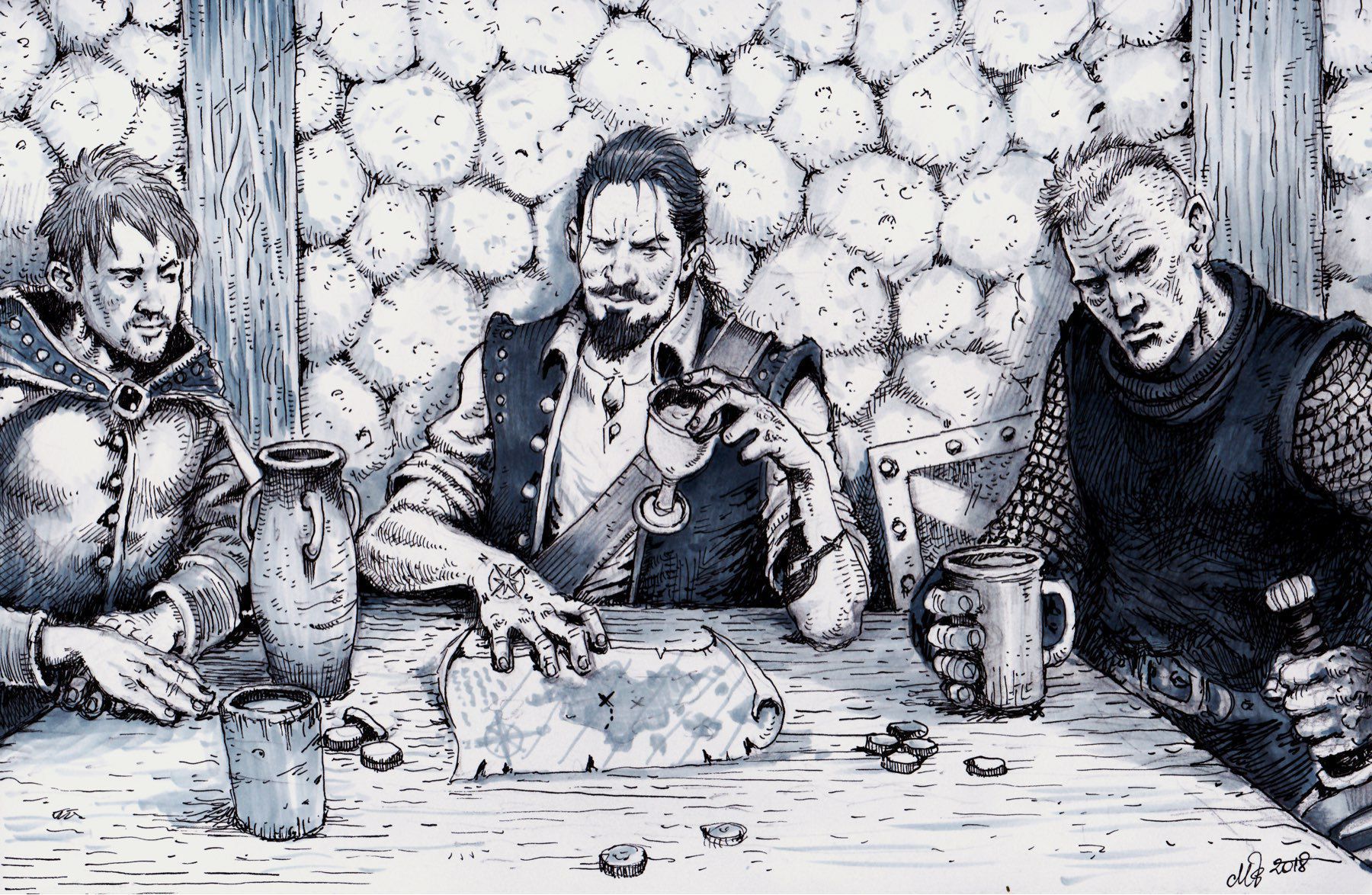
It even includes stylized starting and ending character descriptions & sheets.
As we start to go back through the fiction, it’s amazing to see how much foreshadowing there is about how the situation and the characters will turn out.
Because it was my character, I’ve included pictures of how Gyles started out. How he ended was an entirely different picture…. 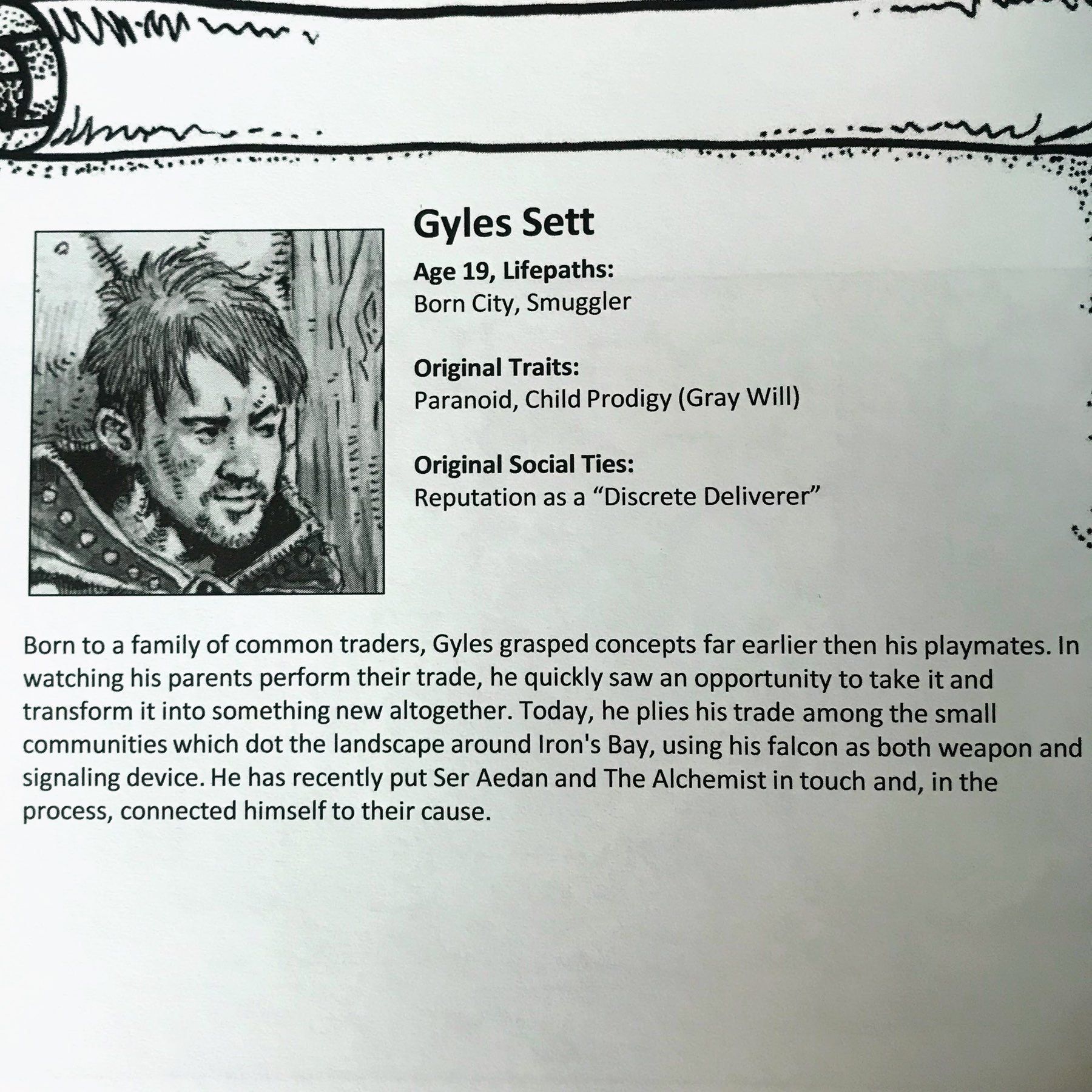
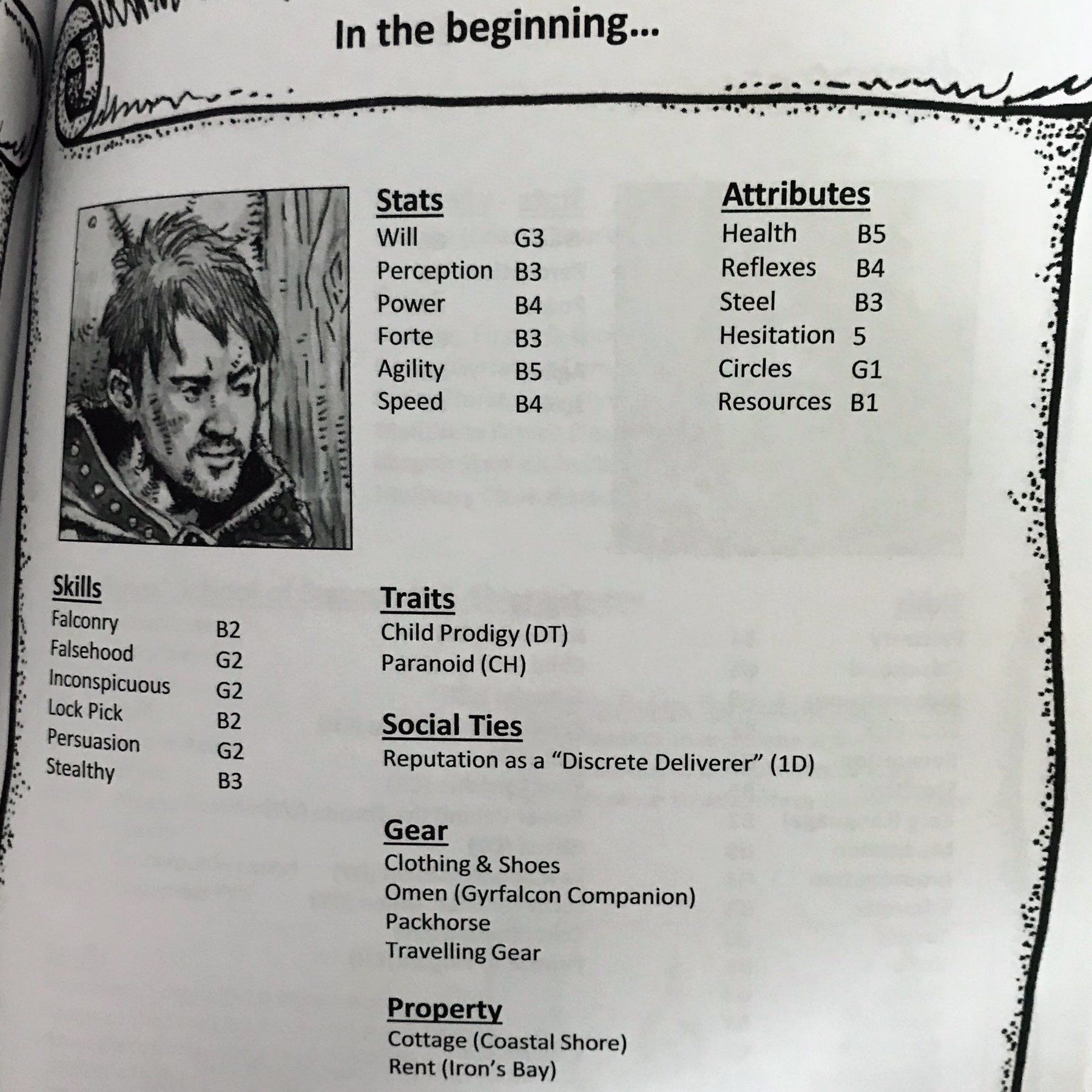
I am really excited about this book. Ask me anything!
Let’s have an Epiphany
“For, look, darkness covers the earth
and deep darkness covers the nations,
but the Lord shines on you;
his splendor appears over you.”
Epiphany
The twelve days of Christmas have concluded, and we are now in Epiphany. This is when Christians celebrate the arrival of the Magi who came to witness the newborn Jesus. In some traditions, we also celebrate his baptism, or even Jesus’s miracles and ministry.
Epiphany is a “manifestation”. As the verse above alludes to, and as Pastor Shannon says, it’s the “Light breaking in.”
In these dark times, where are you seeing the light breaking in?
A Theme for January
In Common Prayer, the suggested theme for January is “Shared Economics.” The economics of Caesar and Empire are harmful to people and the world, but the Spirit repeatedly calls people to live differently. The prophets and Jesus had a lot to say about how we handle economics, yet it’s a topic that many Christians avoid engaging deeply. In January, we are invited to investigate alternatives and to perform holy experiments.
This January, I’ll be reading and writing about one of the suggested books: God’s Economy: Redefining the Health and Wealth Gospel.
Want to join me? Let me know!
2018 Book Review
Goodreads records the entirety of my 2018 reading, here, but I’d like to specifically offer to you the books that I enjoyed the most.
I didn’t read any books this year that I gave 5 stars (these are rare for me), but I read many that were very good (4-stars). I’d be delighted to discuss any of them!
Nonfiction
Fiction
Related: other 2018 Review Posts:
2018 Mentoring Update
One of my greatest pleasures is mentoring and coaching. Helping people grow, learn, and achieve their goals is a great feeling and incredibly rewarding.
One of my objectives in mentoring is to make sure that underrepresented and marginalized people are getting solid support and seeing growth opportunities. In 2018 I worked with five people (outside my org chart, that is), and four of them are from backgrounds typically underrepresented within STEM (in general) and information security (in particular). Being involved with inclusive employee resource groups is a good thing in general, but also helped to make connections that helped foster this objective.
We had a lot of great conversations this year, asked a lot of good questions, and leaned into challenges. While I can’t dig into specifics of these (obviously), here are a few outcomes I’m happy to highlight:
I’m looking forward to new mentoring opportunities in 2019!
Related: other 2018 Review Posts:
2018 Podcast Review
I’ve added and culled a lot of podcasts over the last few years. Here are top ones on my list, and why I listen to them.
I recommend Overcast for listening to podcasts, and am a happy subscriber.
Related: other 2018 Review Posts:
Schneier: How Surveillance Inhibits Freedom of Expression
We don’t yet know which subversive ideas and illegal acts of today will become political causes and positive social change tomorrow, but they’re around. And they require privacy to germinate. Take away that privacy, and we’ll have a much harder time breaking down our inherited moral assumptions. How Surveillance Inhibits Freedom of Expression
On regression in game design
The impact of a mechanically bad rule is usually that refs have to house rule around it, which they love doing. The impact of a socially, culturally bad rule is the propagation of bullshit that we as a culture have been trying to work past and through.
Re: the OSR scene
This was my response to Martin Ralya’s concerns about the OSR scene:
Aaron’s comments kind of hit it for me: being defined by “old-school” brings this “remember the good old days?” vibe, which attracts not just people who think fondly of the “good old days” of games, but also folks who think fondly of not having their privilege challenged. This makes it (whether intentional or not) a fundamentally political statement, but also the kind of political statement that carries these “don’t be political” demands which seek to defend any remaining unequal power which they feel is being threatened. I think we’re seeing this play out more and more. To save this community, I think it would need to focus more on the tangibles of the games themselves (what system, design, or theme issues matter to the community?) and less on the nostalgic “member berries”. And it would need a new name that represents those things.